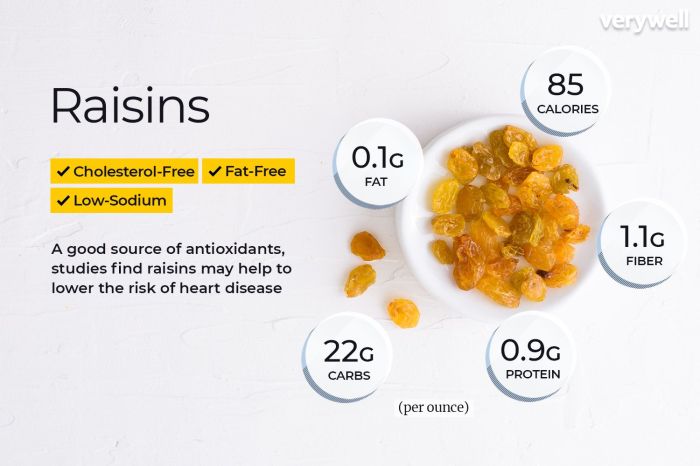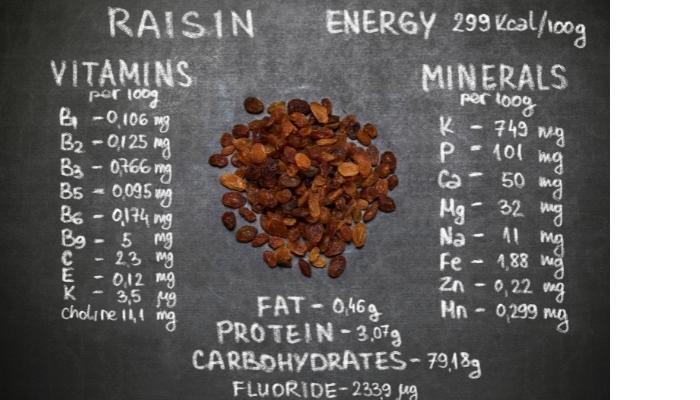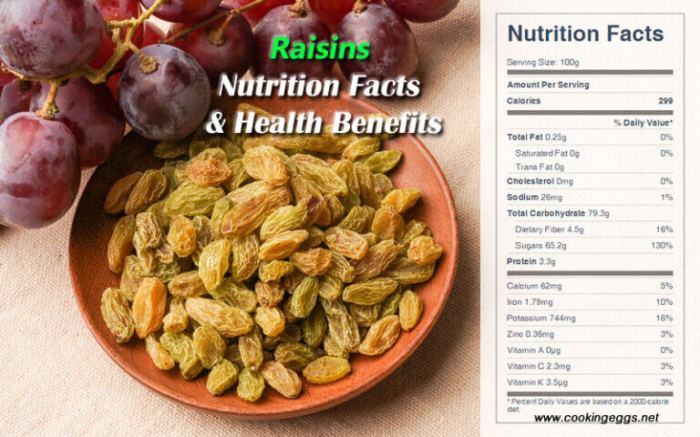Nutritional Composition of Raisins: Nutrition Facts For Raisins

Nutrition facts for raisins – Raisins, those sweet and chewy little nuggets, pack a surprising nutritional punch. Often overlooked as a mere snack, they offer a concentrated source of energy and various essential nutrients. Let’s delve into the detailed nutritional breakdown of these tiny powerhouses.
Understanding nutrition facts is crucial for informed dietary choices. Raisins, for example, offer a concentrated source of natural sugars and fiber. However, comparing the caloric density and micronutrient profile of raisins to other functional beverages, such as those detailed in the kin euphorics nutrition facts provides a broader perspective on nutritional intake. Ultimately, a balanced diet incorporating various nutrient sources, like raisins, alongside considered choices based on other product information is key to overall health.
Macronutrient Composition of Raisins
The macronutrient profile of raisins reveals a significant carbohydrate content, with smaller amounts of protein and negligible fat. This makes them a readily available source of energy, particularly useful for athletes or individuals needing a quick energy boost. The following table provides a clearer picture, based on a typical serving size of 1/4 cup (approximately 40 grams) of raisins:
| Nutrient | Amount per Serving | % Daily Value | Notes |
|---|---|---|---|
| Carbohydrates | 30g | 10% | Primarily sugars, providing quick energy. |
| Protein | 1g | 2% | Relatively low in protein compared to other food sources. |
| Fat | 0g | 0% | Essentially fat-free. |
Micronutrient Content of Raisins
Beyond macronutrients, raisins are a good source of several essential micronutrients, contributing to overall health and well-being. These include:
Raisins are rich in various vitamins and minerals that play crucial roles in bodily functions. Their contribution to daily nutritional needs is significant, especially considering their small serving size.
- Vitamins: Raisins contain small amounts of Vitamin K, various B vitamins (like B6 and B1), and Vitamin C.
- Minerals: They are a notably good source of potassium, an important electrolyte for maintaining healthy blood pressure. They also contain iron, manganese, and copper.
Comparison with Other Dried Fruits
While raisins offer a unique nutritional profile, comparing them to other popular dried fruits like apricots and cranberries helps highlight their strengths and weaknesses.
| Nutrient | Raisins | Apricots | Cranberries |
|---|---|---|---|
| Carbohydrates (g/serving) | 30 | 25 | 20 |
| Fiber (g/serving) | 1 | 2 | 4 |
| Potassium (mg/serving) | 250 | 200 | 100 |
| Vitamin C (mg/serving) | 1 | 5 | 10 |
Note that serving sizes may vary between different dried fruits, affecting the exact nutritional values. This comparison provides a general overview of the relative nutritional differences.
Glycemic Index and Blood Sugar Impact

Raisins, those sweet little nuggets of dried grapes, pack a powerful nutritional punch. But their concentrated sweetness raises a key question: how do they affect blood sugar levels? Understanding the glycemic index (GI) of raisins is crucial for managing blood sugar, especially for individuals with diabetes or those watching their carbohydrate intake.The glycemic index measures how quickly a carbohydrate-containing food raises blood glucose levels after consumption.
Raisins have a moderate to high glycemic index, typically ranging from 64 to 68, depending on factors like the variety of grape, drying methods, and processing. This means that raisins cause a relatively rapid rise in blood sugar compared to low-GI foods. However, the actual impact on an individual’s blood sugar will depend on several factors, including the amount consumed, the overall dietary context, and individual metabolic responses.
Raisin Consumption and Insulin Response
Consuming raisins triggers the release of insulin, the hormone responsible for transporting glucose from the bloodstream into cells for energy. The relatively high GI of raisins leads to a more pronounced and rapid insulin response compared to low-GI foods. This rapid insulin surge can be beneficial for providing quick energy, but it can also lead to subsequent blood sugar dips if not balanced with other nutrients and a healthy eating pattern.
For example, a person consuming a large quantity of raisins might experience a sharp increase in blood sugar followed by a drop, leading to feelings of fatigue or hunger. A balanced approach, such as pairing raisins with protein or fiber-rich foods, can help moderate this response.
Comparison of Raisin GI to Other Fruits, Nutrition facts for raisins
Compared to other dried fruits, raisins generally fall within the middle range in terms of GI. Some dried fruits, like apricots or figs, may have a slightly lower GI, while others, such as dates, might have a higher GI. However, it’s crucial to remember that the GI of dried fruits can vary significantly based on processing methods. When comparing raisins to fresh fruits, the difference is more pronounced.
Fresh grapes, for instance, have a considerably lower GI than raisins due to the water content being removed during the drying process, which concentrates the sugars. This concentration significantly increases the rate of sugar absorption into the bloodstream. For example, fresh grapes might have a GI of around 40-50, whereas raisins, as previously mentioned, have a GI of 64-68.
This highlights the importance of considering the form of the fruit (fresh vs. dried) when assessing its impact on blood sugar.
Raisins in a Balanced Diet

Raisins, those sweet little nuggets of sunshine, can easily find a place in a healthy and balanced diet. While their sweetness might raise eyebrows, their nutritional profile and versatility make them a surprisingly beneficial addition to your daily meals. The key, as with any food, is moderation and mindful incorporation into a well-rounded eating plan.
Including raisins in your diet offers a convenient way to boost your intake of essential nutrients and add a touch of natural sweetness to your meals and snacks. This section will explore practical ways to seamlessly integrate raisins into your daily routine, catering to various dietary needs and preferences.
Sample Meal Plan Incorporating Raisins
A balanced diet incorporates a variety of food groups, and raisins can fit perfectly into this framework. The following sample meal plan demonstrates how to include raisins in a healthy and delicious way.
| Meal | Description |
|---|---|
| Breakfast | Oatmeal with a sprinkle of raisins, a handful of almonds, and a drizzle of honey. |
| Lunch | Quinoa salad with chopped vegetables, feta cheese, and a small amount of raisins for added sweetness and texture. |
| Dinner | Baked chicken breast with roasted vegetables (such as broccoli, carrots, and sweet potatoes) and a side of brown rice. A small portion of raisin-studded couscous could also be included. |
Creative Ways to Incorporate Raisins into Recipes
Beyond simply adding them to cereal, raisins offer a surprising range of culinary applications. Their chewy texture and sweetness can elevate both sweet and savory dishes.
- Baked Goods: Raisins are a classic addition to muffins, breads, cookies, and cakes, adding moisture and sweetness. Consider raisin scones or raisin bread for a wholesome treat.
- Salads: Add a handful of raisins to your favorite salad for a burst of sweetness and a textural contrast. They pair particularly well with salads containing nuts, cheeses, and fruits.
- Oatmeal: Start your day with a boost of energy by adding raisins to your oatmeal. The sweetness complements the wholesome grains.
- Stuffings and Fillings: Incorporate raisins into savory stuffings for poultry or vegetables, adding a unique flavor dimension.
- Rice Dishes: Add raisins to pilafs or other rice-based dishes for a touch of sweetness and texture.
Incorporating Raisins into Diets with Specific Needs
While raisins are generally healthy, individuals with specific dietary needs should exercise caution and moderation. The following considerations are important:
- Diabetes: Due to their sugar content, individuals with diabetes should consume raisins in moderation and monitor their blood sugar levels carefully. They should be included as part of a balanced meal plan, not as a standalone snack. Consider pairing them with foods that have a low glycemic index, such as nuts or seeds.
- Allergies: Raisins themselves do not typically cause allergic reactions. However, individuals with allergies to sulfites should check the label carefully, as some raisins are treated with sulfur dioxide as a preservative.
- Weight Management: While raisins offer nutritional benefits, they are calorie-dense. Portion control is essential when including them in a weight management plan.
FAQ Insights
Are raisins a good source of fiber?
Yes, raisins are a good source of dietary fiber, contributing to digestive health.
Can raisins cause weight gain?
Like any high-sugar food, excessive consumption of raisins can contribute to weight gain. Moderation is key.
Are raisins suitable for people with diabetes?
Due to their high sugar content, people with diabetes should consume raisins in moderation and monitor their blood sugar levels carefully.
How long do raisins last?
Properly stored raisins can last for several months, but check for signs of spoilage like mold or discoloration.
 Interior Living
Interior Living
